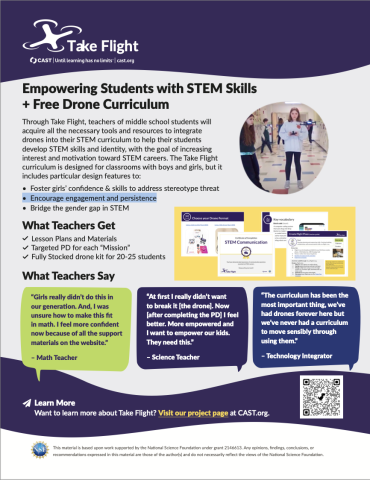Body
Image

Take Flight: Rural Girls, Drones, and STEM Careers
This project uses drones in middle school science and career and technical education classrooms as a mechanism to increase female students awareness of STEM occupations, knowledge and skills in multiple STEM disciplines, and motivation to pursue STEM careers. This project confronts society's messaging and students' own perceptions of who can be, should be, and is good at STEM, which is often reinforced by the notion of there being a single path into STEM. The project will encourage female students from rural areas to develop their own STEM career goals by establishing a clear link between communal goals (those that are collaborative or altruistic) and success in STEM.
Pillar 1: Innovative Use of Technologies in Learning and Teaching
In Take Flight drones serve as the vehicle for larger conversations about the role of technology and the skills that are needed to be successful in STEM careers. Students learn to map airspace, use aviation specific vocabulary and build an understanding of STEM careers. And the curriculum also reinforces the collaborative nature of STEM and the need for varied perspectives to solve complex technology-driven problems. In Take Flight students learn to fly and code drones on cooperative teams.
Pillar 2: Partnerships for Career and Workforce Preparation.
Take Flight has partnered with middle school Career and Technical Education teachers and has been designed to be sustainable by Perkins funding, serving as a mechanism for promoting STEM-CTE courses. Take Flight includes Drone Career videos that highlight the varied STEM careers that use drones - from FAA air traffic controllers, to biologists studying endangered plants, the curriculum includes multiple activities and challenges designed to foster the development of STEM career thinking.
Pillar 3: Strategies for Equity in STEM Education
Take Flight leverages Universal Design for Learning Principles by providing materials in flexible formats, offering flexible tasks relevant to contexts with varied technology access, and rural educators and students as co-designs to remove access and implementation barriers. The curriculum highlights female role models working in STEM careers that use drones and the professional development includes research-based teacher "moves" that have proven effective for building motivation for STEM for middle school girls.

Discipline(s)
Interdisciplinary
Target Gradespan(s)
Middle school (6-8)
Target Participant(s)
Educators
Project Setting(s)
Formal Education
Category
Developing and Testing Innovations (DTI)